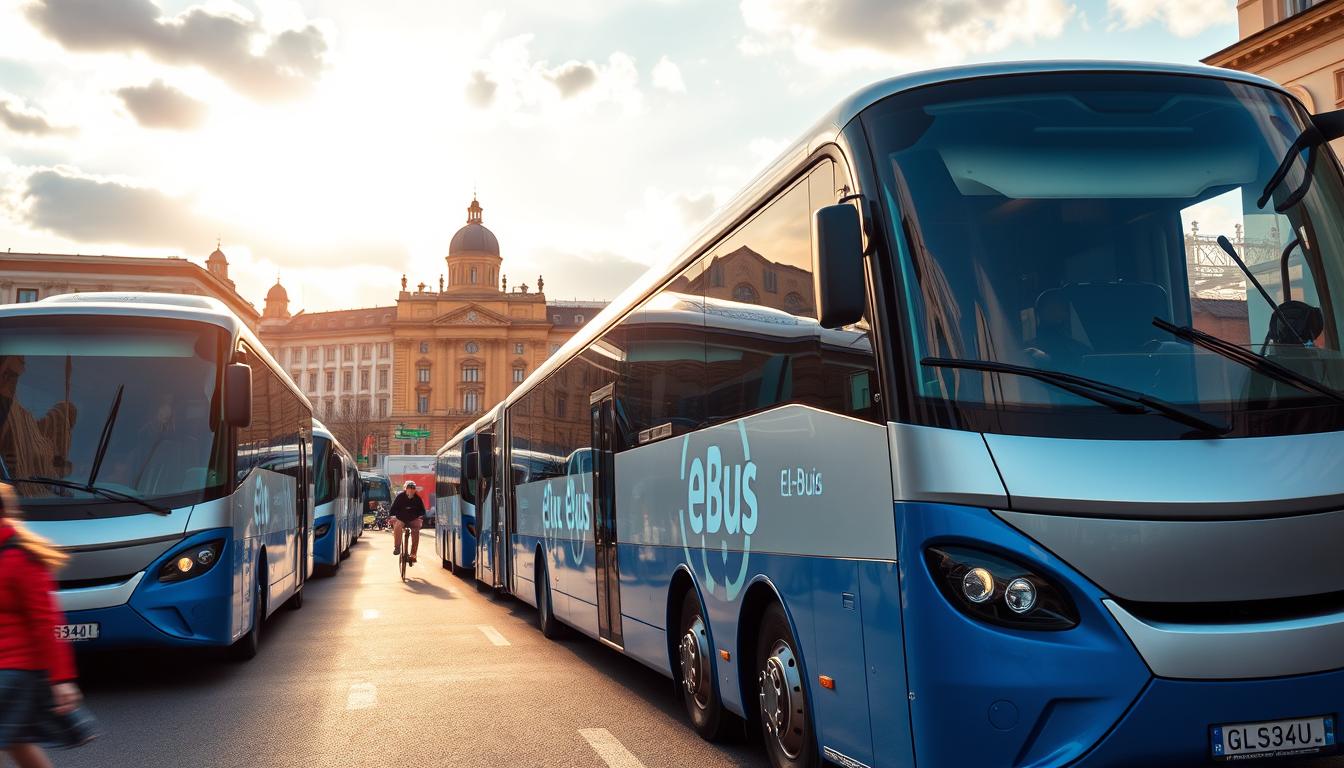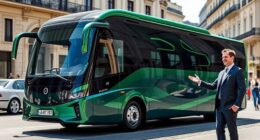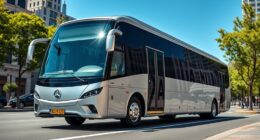Electric buses are revolutionizing public transportation in various parts of the world, and Germany is at the forefront of this change. As the country rapidly electrifies its transportation sector, it aims to combat climate change and promote sustainable mobility.
With a focus on reducing emissions, German companies are adopting electric buses as a key strategy. This shift not only helps in mitigating climate change but also contributes to a cleaner environment.
Key Takeaways
- Germany is rapidly electrifying its transportation sector.
- Electric buses are a key strategy for reducing emissions.
- German companies are embracing sustainable mobility solutions.
- The adoption of electric buses is a significant step in combating climate change.
- Sustainable transportation is becoming increasingly important.
The Rise of Electric Buses in Germany’s Climate Strategy
With a focus on combating climate change, Germany is embracing electric buses as a key component of its sustainable transportation initiatives. The country aims to reduce carbon emissions by at least 65% by 2030 compared to 1990 levels, and electric buses are playing a crucial role in achieving this goal.
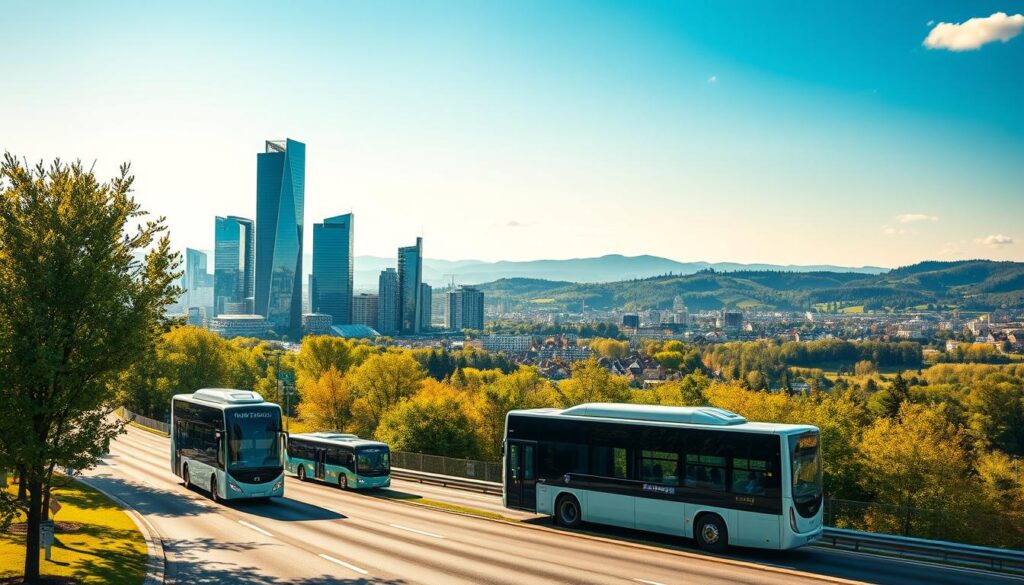
Current Climate Challenges Facing Germany
Germany is facing significant climate challenges, including rising temperatures and increased greenhouse gas emissions. The transportation sector is a major contributor to these emissions, making the adoption of sustainable transportation solutions critical. Electric buses offer a cleaner alternative to traditional diesel-powered buses, reducing emissions and helping to mitigate the impact of climate change.
The need for green mobility initiatives in Germany is pressing, with urban areas particularly affected by air pollution. By transitioning to electric buses, cities can significantly improve air quality and reduce the negative health impacts associated with poor air quality.
The Strategic Shift to Electric Public Transportation
The strategic shift towards electric public transportation is a key component of Germany’s climate strategy. Electric buses are not only environmentally friendly but also offer a quieter and smoother ride, enhancing the overall passenger experience. As part of this shift, German companies are investing heavily in electric bus technology and infrastructure, driving innovation and reducing costs.
By adopting electric buses, Germany is moving closer to achieving its climate goals while also promoting sustainable transportation practices. This transition is expected to have a positive impact on the environment, public health, and the economy in the long term.
How German Companies Are Protecting the Climate with Electric Buses
As Germany continues to combat climate change, companies are increasingly turning to electric buses as a viable solution. This strategic shift is not only beneficial for the environment but also aligns with the country’s ambitious climate targets. German companies are leveraging electric vehicle incentives offered by the government to adopt cleaner transportation options.
Emission Reduction Potential of Electric Bus Fleets
The adoption of electric bus fleets in Germany has significant emission reduction potential. By transitioning from traditional diesel buses to electric ones, companies can substantially decrease their carbon footprint. For instance, companies with e-vehicle fleets, including buses and trucks, are eligible for the GHG Quota program, with premiums ranging from 8,000 to 10,500 euros per vehicle. This incentive encourages companies to invest in electric buses, contributing to a cleaner environment.
Moreover, electric buses produce zero tailpipe emissions, reducing air pollution in urban areas. This is particularly important in densely populated cities where air quality is a major concern. By adopting electric buses, German companies are not only reducing greenhouse gas emissions but also improving the quality of life for urban residents.
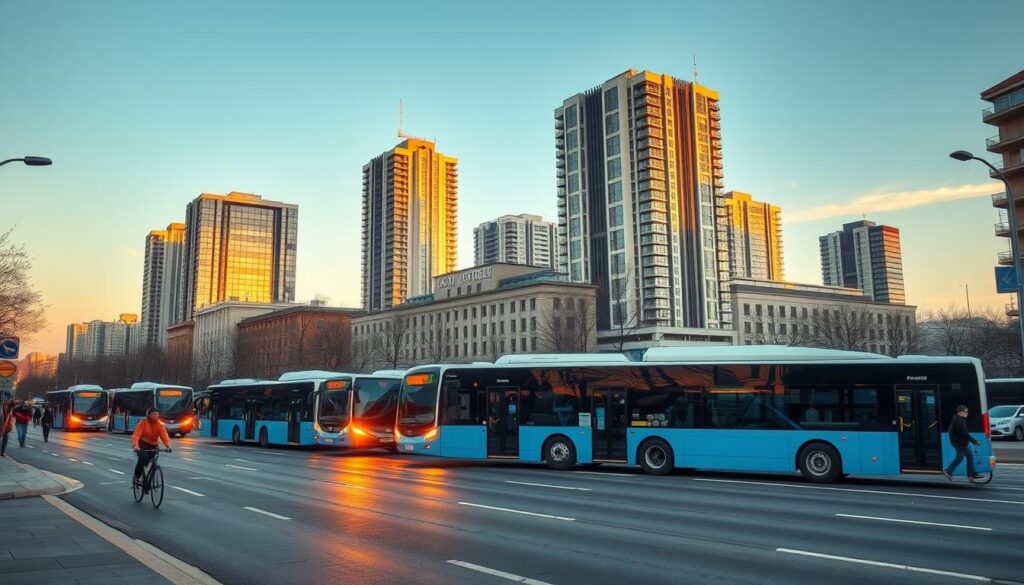
Integration with Renewable Energy Sources
One of the key advantages of electric buses is their potential to be powered by renewable energy sources. When charged with electricity generated from solar or wind power, electric buses can operate with a significantly reduced carbon footprint. German companies are at the forefront of integrating electric bus fleets with renewable energy sources, further enhancing the environmental benefits of their green mobility initiatives.
This integration is part of a broader strategy to create a sustainable transportation system. By combining electric buses with renewable energy, Germany is setting a precedent for other countries to follow. This approach not only supports the country’s climate goals but also contributes to a more sustainable future for the transportation sector.
Mercedes-Benz: Leading the Electric Bus Revolution
Mercedes-Benz is at the forefront of Germany’s electric bus revolution with its innovative eCitaro model. As the country accelerates its transition to sustainable transportation, the eCitaro is playing a crucial role in reducing emissions and enhancing public transit.
Features and Environmental Impact
The eCitaro boasts advanced technology, including a robust electric drivetrain and a sophisticated battery management system. Its design not only improves energy efficiency but also significantly reduces environmental impact.
Key Features of the eCitaro:
- High-capacity battery for extended range
- Efficient electric drive system
- Advanced regenerative braking
- Low noise operation for a better passenger experience
Success Stories from Berlin and Hamburg
Cities like Berlin and Hamburg have successfully integrated Mercedes-Benz’s eCitaro into their public transportation fleets. These cities have seen a notable decrease in emissions and an improvement in air quality.
| City | Number of eCitaro Buses | Emission Reduction |
|---|---|---|
| Berlin | 100 | 500 tons CO2 annually |
| Hamburg | 50 | 250 tons CO2 annually |
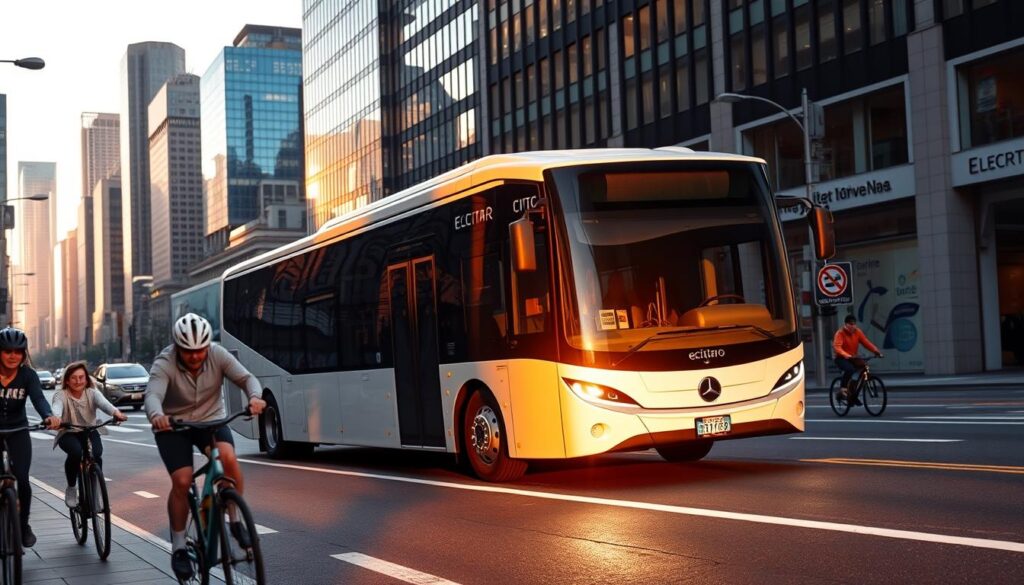
MAN Truck & Bus: Innovative Solutions for Sustainable Transit
MAN Truck & Bus is revolutionizing sustainable transit with its innovative electric bus solutions. As a key player in Germany’s transportation sector, the company is committed to reducing emissions and promoting green mobility initiatives across the country.
The Lion’s City E: Technical Specifications and Benefits
The Lion’s City E is MAN Truck & Bus’s latest electric bus model, designed to offer efficient and sustainable public transportation. With advanced technical specifications, this bus boasts a range of up to 200 kilometers on a single charge, making it ideal for urban routes.
Some of the key features of the Lion’s City E include:
- Zero emissions, reducing air pollution in urban areas
- Low operating costs due to efficient electric propulsion
- Quiet operation, enhancing the passenger experience
| Technical Specifications | Details |
|---|---|
| Range | Up to 200 km |
| Charging Time | 4-6 hours |
| Passenger Capacity | Up to 100 passengers |
MAN’s Implementation in Munich and Frankfurt
MAN Truck & Bus has successfully implemented its electric bus fleet in several German cities, including Munich and Frankfurt. These cities are leveraging electric vehicle incentives offered by the German government to transition to zero-emission public transportation.
In Munich, MAN’s electric buses are operating on busy routes, significantly reducing the city’s carbon footprint. Similarly, in Frankfurt, the Lion’s City E is being used to enhance the city’s public transportation network, providing residents with a cleaner and more sustainable travel option.
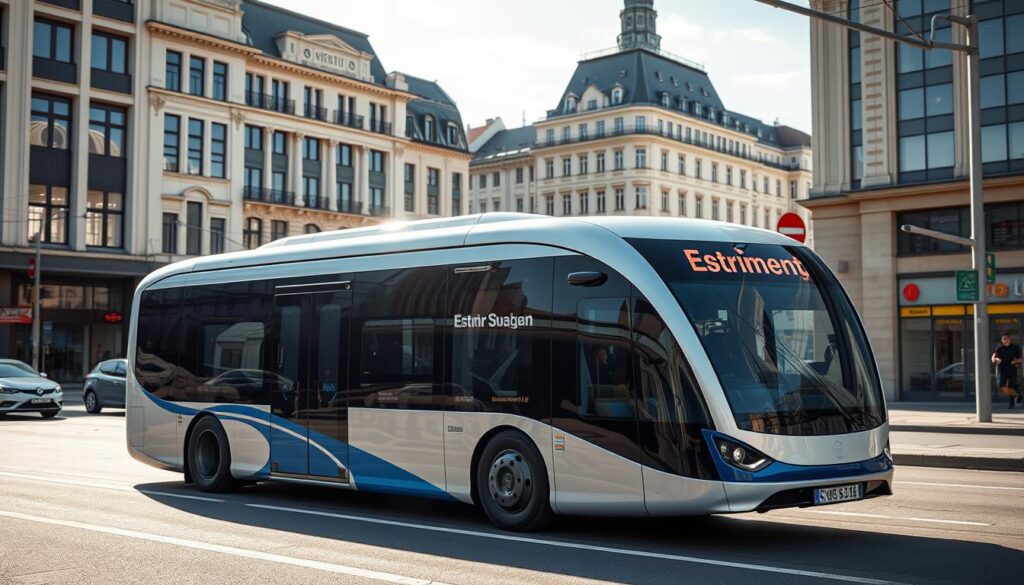
Volkswagen’s Electric Bus Initiatives Through Traton Group
As part of its commitment to sustainable transportation, Volkswagen’s Traton Group is leading the charge in electric bus technology. The Traton Group, formed by Volkswagen AG, comprises three renowned truck manufacturers: MAN, Scania, and Volkswagen Trucks. This strategic grouping enables a comprehensive approach to developing electric bus solutions.

Scania’s Contribution to Germany’s Electric Bus Fleet
Scania, a key player within the Traton Group, has been instrumental in advancing electric bus technology in Germany. With its extensive experience in manufacturing buses and coaches, Scania has successfully integrated electric powertrains into its fleet, offering a cleaner alternative for public transportation. Scania’s electric buses are designed to provide efficient, quiet, and emission-free transportation, aligning with Germany’s climate goals.
Volkswagen’s Investment in Charging Infrastructure Across German Cities
Volkswagen, through its Traton Group, is not only focusing on the production of electric buses but also investing heavily in the necessary charging infrastructure. By developing comprehensive charging networks across German cities, Volkswagen is addressing one of the primary barriers to electric bus adoption: range anxiety. This investment is crucial for ensuring that electric buses can operate efficiently and reliably, supporting the transition to sustainable public transportation.
| Company | Contribution | Impact |
|---|---|---|
| Scania | Electric Bus Manufacturing | Reducing emissions in urban areas |
| Volkswagen | Charging Infrastructure | Mitigating range anxiety for electric buses |
| Traton Group | Strategic Oversight | Coordinating electric bus adoption efforts |
By combining innovative electric bus manufacturing with strategic investments in charging infrastructure, Volkswagen’s Traton Group is poised to significantly accelerate electric bus adoption in Germany, contributing to a more sustainable transportation sector.
German Government Policies Accelerating Electric Bus Adoption
With a strong commitment to reducing carbon emissions, Germany has introduced various policies to accelerate the adoption of electric buses. This commitment is part of a broader strategy to mitigate climate change and promote sustainable transportation across the country.
The German government has recognized the potential of electric buses in reducing urban pollution and greenhouse gas emissions. As a result, it has launched several federal incentives and funding programs to support their adoption.
Federal Incentives and Funding Programs
The federal government has established programs to provide financial support for the purchase of electric buses and the development of necessary charging infrastructure. For instance, the “Klimaschutzprogramm” (Climate Protection Program) offers significant funding for municipalities transitioning to electric bus fleets.
According to recent data, the German government has allocated substantial funds to support the transition to electric mobility in public transportation. This includes grants and subsidies for bus manufacturers, operators, and infrastructure developers.
| Program Name | Funding Allocation | Target Beneficiaries |
|---|---|---|
| Klimaschutzprogramm | €500 million | Municipalities, Public Transport Operators |
| Elektromobilitätsförderung | €200 million | Bus Manufacturers, Infrastructure Developers |
Regional Initiatives Supporting Zero-Emission Public Transport
Beyond federal programs, various regional initiatives are underway to support the adoption of zero-emission public transport. Cities like Berlin, Munich, and Hamburg are at the forefront, implementing their own strategies to promote electric buses.
“The transition to electric buses is a crucial step towards achieving our climate goals. We are committed to supporting this transition through innovative policies and funding.” –
Regional initiatives include the development of electric bus corridors, investment in local charging infrastructure, and collaboration with private sector companies to innovate and implement new technologies.
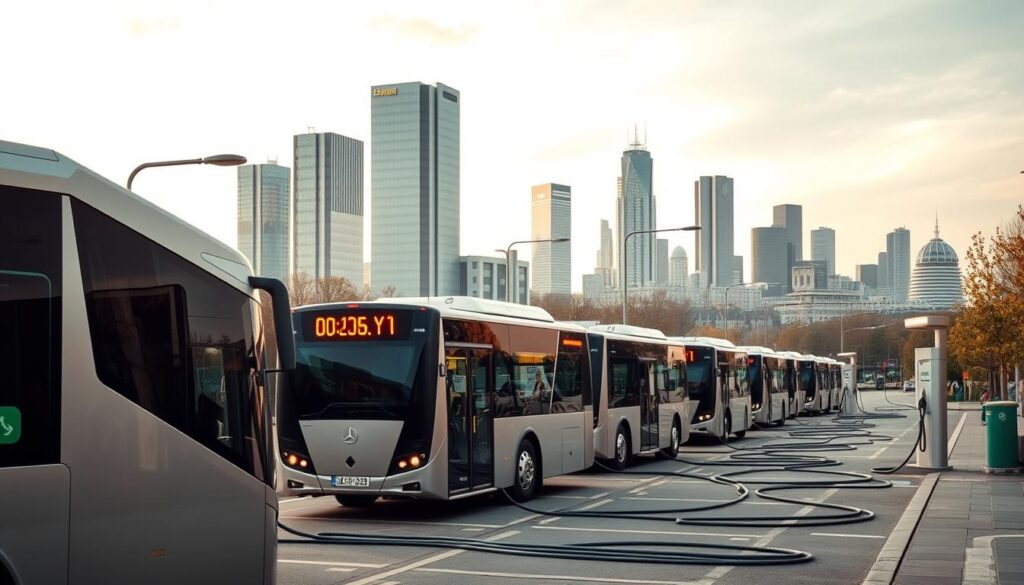
These efforts are expected to not only reduce emissions but also to stimulate local economies through the creation of green jobs and the development of new industries related to electric mobility.
Smaller German Innovators Making Big Impacts
Germany’s transition to electric buses is not just driven by large corporations; smaller innovators are also making substantial contributions. These companies are bringing fresh perspectives and specialized solutions to the table, further accelerating the adoption of green mobility initiatives in Germany.
Eurabus: The Berlin-Based Electric Bus Pioneer
Eurabus is a notable example of a smaller German company leading the charge in electric bus innovation. Based in Berlin, Eurabus has been at the forefront of developing electric bus solutions that cater to the specific needs of urban transportation systems. Their commitment to sustainable transportation is evident in their cutting-edge technology and designs.
Quantron AG: Converting Existing Fleets to Electric
Quantron AG is another innovator making significant strides in the electric bus sector. Specializing in converting existing diesel fleets to electric, Quantron AG offers a cost-effective and environmentally friendly solution for cities looking to reduce their carbon footprint. Their technology enables a seamless transition to green mobility, supporting Germany’s climate goals.
Elektro-Fahrzeuge Stuttgart (EFA-S): Specialized Electric Solutions
Elektro-Fahrzeuge Stuttgart (EFA-S) is a Stuttgart-based company that has carved a niche for itself in providing specialized electric vehicle solutions. EFA-S focuses on the development and production of electric buses and other electric vehicles, contributing to the diversification of Germany’s sustainable transportation options.
These smaller innovators, among others, are playing a vital role in Germany’s push towards a more sustainable and environmentally friendly transportation system. Their contributions underscore the breadth of commitment across the German industry to reducing emissions and promoting green mobility initiatives.
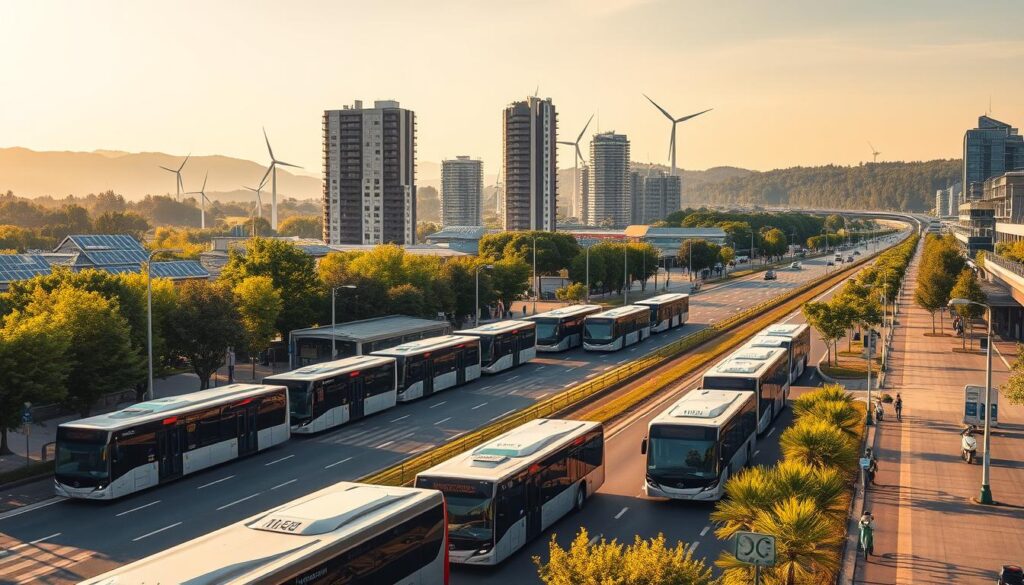
Challenges and Solutions in Electric Bus Implementation
The adoption of electric buses in Germany is not without its hurdles, but innovative solutions are being developed. As the country continues to embrace electric buses as a key component of its climate change mitigation strategies, addressing the challenges associated with their implementation is crucial.
Overcoming Range Anxiety with German Engineering
One of the primary concerns with electric buses is range anxiety—the fear that the bus will run out of charge before reaching its destination. German engineering is playing a vital role in alleviating this concern. Companies like Mercedes-Benz and MAN Truck & Bus are developing electric buses with advanced battery management systems and optimized routes to minimize range anxiety.
Battery Technology Advancements by German Research Institutes
Advancements in battery technology are critical to the widespread adoption of electric buses. German research institutes are at the forefront of this innovation, developing more efficient, durable, and cost-effective batteries. For instance, research into solid-state batteries promises to significantly enhance the performance and range of electric buses.
| Research Institute | Focus Area | Impact |
|---|---|---|
| Fraunhofer Institute | Battery Technology | Improved Efficiency |
| German Aerospace Center (DLR) | Energy Storage | Enhanced Durability |
| Karlsruhe Institute of Technology (KIT) | Solid-State Batteries | Increased Range |
Addressing Cold Weather Performance in Northern German Regions
Cold weather can significantly impact the performance of electric buses, particularly in Northern Germany. To address this, manufacturers are developing thermal management systems that maintain optimal battery temperatures, even in harsh winter conditions. This ensures that electric buses remain reliable and efficient throughout the year.
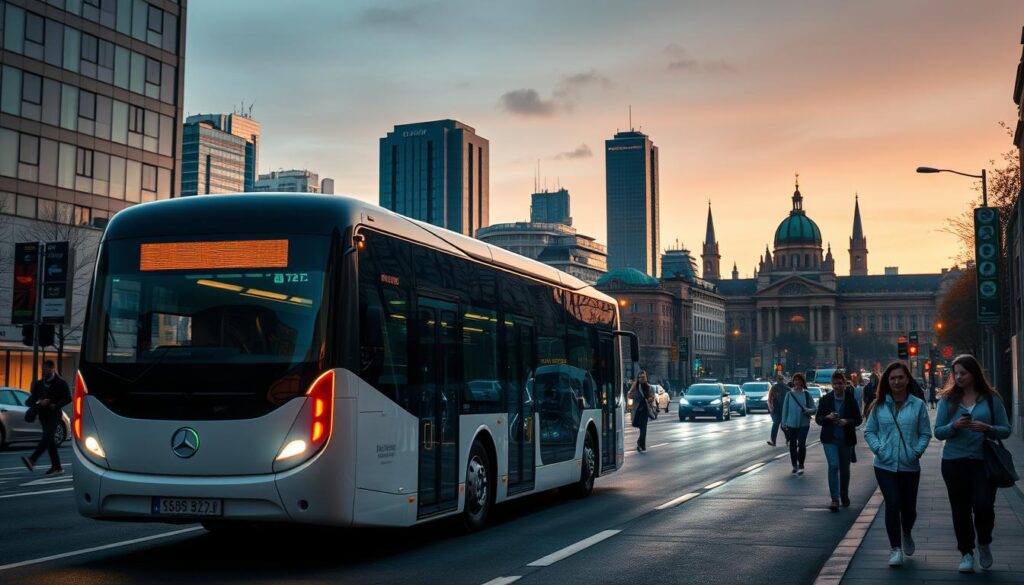
By addressing these challenges, Germany is poised to continue its leadership in electric bus adoption, contributing significantly to global climate change mitigation efforts. The combination of innovative technology, robust infrastructure, and supportive policies is making electric buses an increasingly viable option for public transportation systems around the world.
Conclusion: Germany’s Electric Bus Future and Global Impact
Germany’s efforts in adopting electric buses are setting a significant precedent for other countries to follow in the pursuit of sustainable transportation. The country’s commitment to green mobility initiatives is evident in its comprehensive approach to integrating electric buses into its public transportation systems.
By leveraging the expertise of renowned manufacturers like Mercedes-Benz, MAN Truck & Bus, and Volkswagen’s Traton Group, Germany is not only reducing its carbon footprint but also driving innovation in the electric vehicle sector. The success stories from cities like Berlin, Hamburg, and Munich demonstrate the potential for widespread adoption of electric buses.
Germany’s progress in sustainable transportation is expected to have a ripple effect globally, encouraging other nations to accelerate their green mobility initiatives. As the world continues to urbanize, the importance of efficient, environmentally friendly public transportation systems will only continue to grow, making Germany’s electric bus revolution a crucial step towards a more sustainable future.

